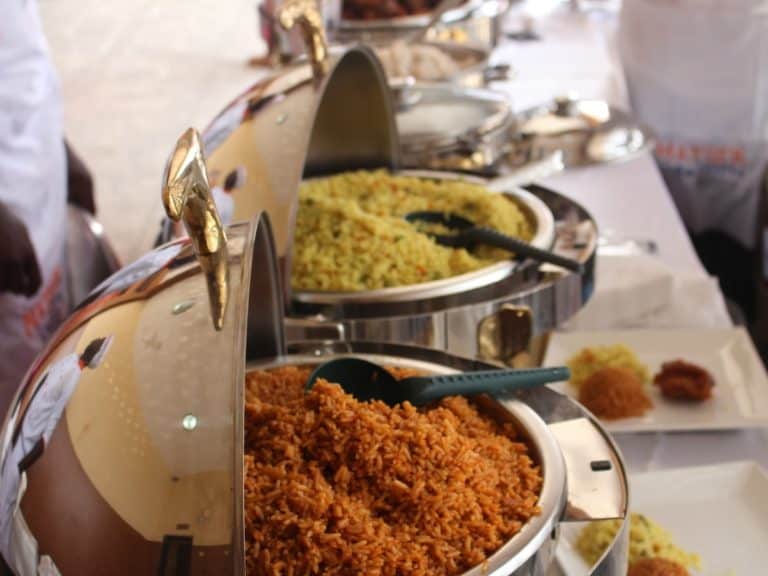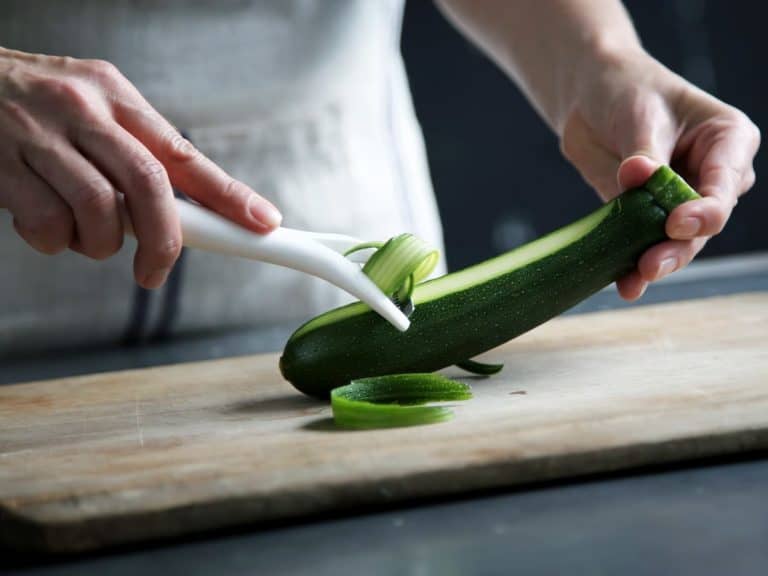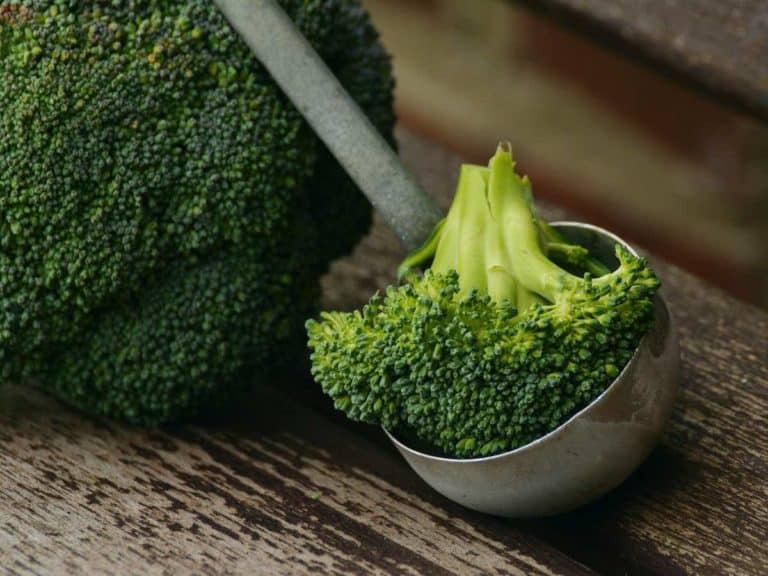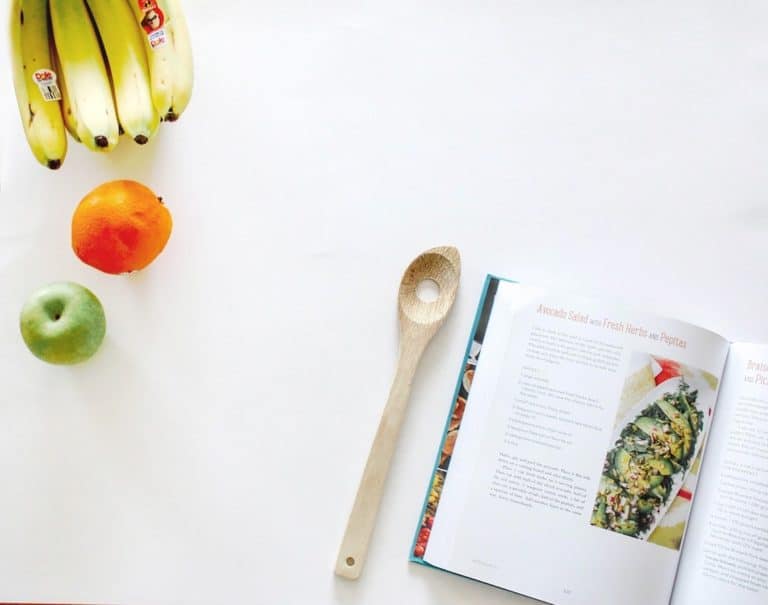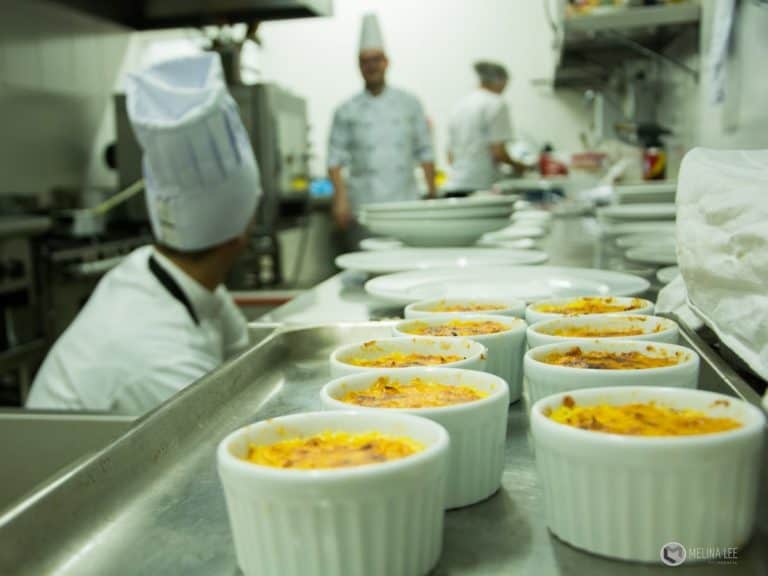What Makes a Good Cook: Education and Qualities
So, you love scouring the internet for some great recipes and trying them out, too. Many of your family members and friends have also vouched for your superior cooking skills. Does this mean being a cook is your calling?
Willingness to learn, having passion and the ability to be a team player are some of the things that make a cook good. It goes without saying that a cook, in order to succeed, knows how to follow recipes, exhibit creativity, take criticisms, work under pressure, and meet health and safety standards.
On the fence as to whether or not you would make for an excellent cook? Keep reading this post — we will talk about some of the most important characteristics and traits a cook should have in order to be good. After checking out the entirety of this article, you will learn if you have what it takes to shine as a professional cook.
But before anything else, let’s answer this pressing question many feel too shy to ask…
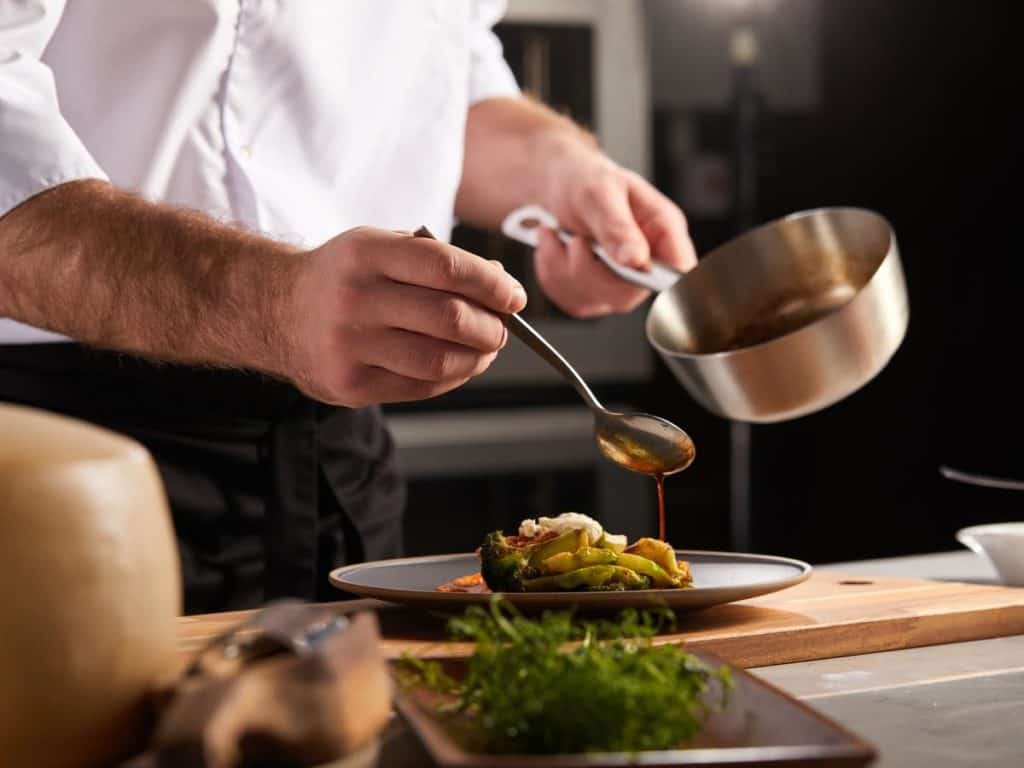
What’s the Difference Between a Cook and a Chef?
Simply put, a cook is someone who prepares food by following established recipes. A chef, on the other hand, is a professional who is trained not only to cook but also to understand various cooking methods and flavors in order to be able to come up with recipes. A chef also oversees a kitchen and trains staff.
Many people tend to use “cook” and “chef” interchangeably in their everyday conversations.
It’s true that, at first glance, it would seem like cooks and chefs carry out the same tasks in the kitchen. However, there are many differences between these culinary experts that are not apparent unless you dig a little deeper.
Thinking about whipping up winning dishes at a casino, hotel, restaurant or another food service establishment one day? You should definitely know the various things that make a chef a chef and a cook a cook so that you can get a much better idea of which job title will suit you so much better.
Let’s compare cooks and chefs based on these different factors:
Educational background
If truth be told, there is no formal education required for individuals who would like to become chefs. But if the goal is to be a highly paid chef, it’s a good idea to have at least an associate degree in culinary arts. Besides a college diploma, having extensive hands-on training as an apprentice is also key to a lucrative career as a chef.
Meanwhile, having just the right amount of exposure and training would usually suffice for those who would like to become cooks. Often, cooks can be trained according to what they need to prepare and where they have to work.
Job title
There are different types of chefs. Similarly, there are different types of cooks. The title they brandish depends on factors such as where in the kitchen they are stationed and what job they are tasked with, too. However, one thing will always remain true: a cook will always work under a chef in order to make the kitchen and business run.
Because of their extensive educational background and training, it isn’t surprising why a chef can take on many different roles within a commercial kitchen. They range anywhere from an entry-level post to a managerial position.
It’s exactly for this reason why chefs can have a variety of titles, including:
- Chef-owner (group chef)
- Executive chef (chef de cuisine or head chef)
- Sous chef (second chef or under chef)
- Senior chef (chef de partie or station chef)
- Pastry chef (patissier)
- Sauce chef (saucier or saute chef)
- Fish chef (poissonier)
- Vegetable chef (entremetier)
- Meat chef (rotisseur or roast chef)
- Pantry chef (garde manger)
- Fry chef (friturier)
- Grill chef (grillardin)
- Butcher chef (boucher)
Cooks also have a number of duties and responsibilities in a kitchen setting, oftentimes making their work just as hectic and demanding as that of chefs. But due to the fact that chefs have more training and skills under their belt, cooks can only do so much in the kitchen — unless chefs delegate new tasks to them.
There are different job titles that cooks can have, and they are the following:
- Line cook (commis)
- Prep cook (kitchen porter, kitchen hand or kitchen assistant)
- Relief cook (chef de tournant, roundsman or swing cook)
- Short order cook
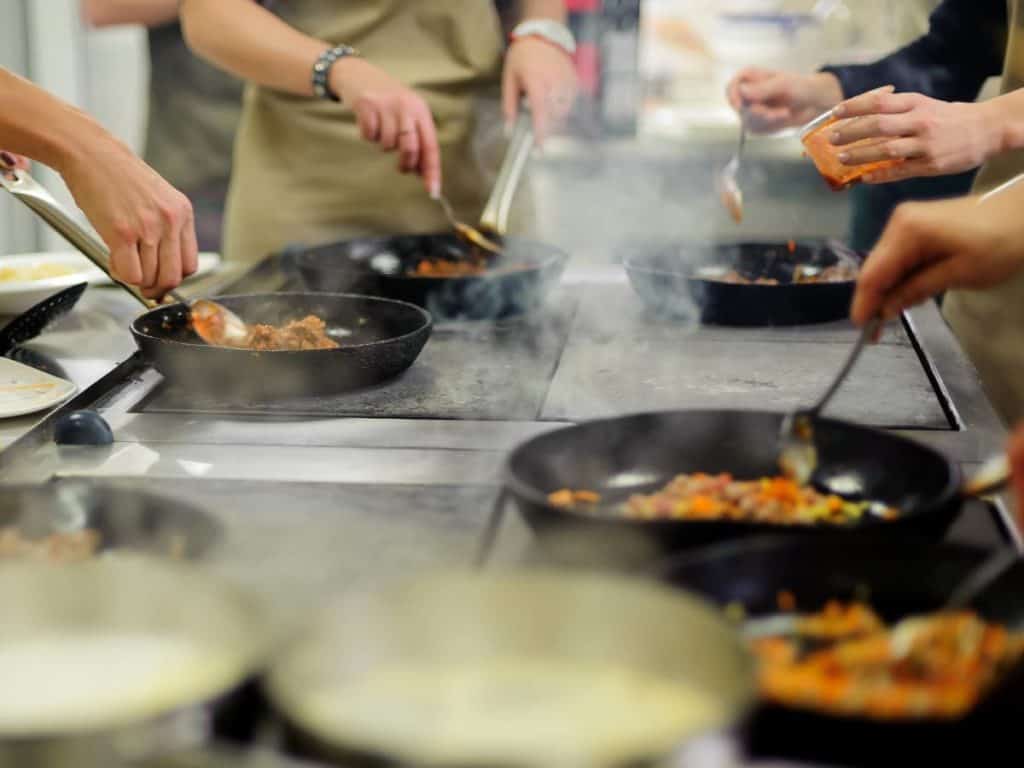
Salary
Generally speaking, the more extensive the training requirements and the more challenging the duties and responsibilities are of professionals, the more money they make.
In the US, the average base salary of chefs is $17.38 per hour — that’s equivalent to $921 per week, $3,562 per month or $50,311 per year. Some of the highest-paid chefs in the land are head chefs, with the vast majority of them making an average of $56,688 per year. Some of the highest paying cities for head chefs include:
- New York City, New York: $76,193 per year
- Atlanta, Georgia: $66,975 per year
- San Antonio, Texas: $65,748 per year
- Seattle, Washington: $64,860 per year
- Charlotte, North Carolina: $61,302 per year
- Milwaukee, Wisconsin: $58,758 per year
- Charleston, South Carolina: $57,943 per year
- Madison, Wisconsin: $54,479 per year
- Phoenix, Arizona: $51,643 per year
Meanwhile, the average base salary of cooks in the US is $14.13 per hour — that’s $784 per week, $3,035 per month or $42,869 per year. Among the various types of cooks, line cooks are those that tend to get paid the most, with most of them getting an average of $46,156 per year. Cities that pay line cooks the highest are:
- New York City, New York: $55,121 per year
- Chicago, Illinois: $52,555 per year
- Los Angeles, California: $52,107 per year
- Atlanta, Georgia: $47,688 per year
- Miami, Florida: $46,395 per year
- Charlotte, North Carolina: $44,460 per year
- Orlando, Florida: $43,814 per year
- Las Vegas, Nevada: $41,826 per year
- Houston, Texas: $41,076 per year
Working hours
It’s not uncommon for both chefs and cooks to spend long hours in the kitchen, their workplace.
This is especially true for those who are working at busy restaurants or other food service establishments as well as starting out in the industry — chefs and cooks who have just joined the workforce typically work 50 to 70 hours per week.
Because customers don’t quit getting their hands on delicious food, chefs and cooks have to work whether it’s early in the morning or late at night or whether it’s a regular day or a holiday.
But as both chefs and cooks climb up the ranks, they tend to work fewer hours — about 40 to 50 hours per week.
Spending most of their waking hours in the kitchen is beneficial for starting out chefs and cooks. That’s because it allows them to gather as many skills as they can and sharpen as many of them as possible, too. Long work hours can also prove to be beneficial for aspirants who plan on making it big one day through apprenticeship.
What’s nice about cooks is that they stop working the minute that they step foot outside the kitchen and the establishment closes — they can then start to focus on their personal lives.
Unfortunately, in most instances, the same cannot be said for a lot of chefs. Because chefs are also tasked with coming up with new recipes as well as improving currently existing ones, it’s not unlikely for them to spend their time outside the commercial kitchen cooking up things that can keep the customers wanting more.
Top 10 Qualities of a Good Cook
Many people can cook. However, not all those who can cook at home can cook in commercial kitchens. And not all cooks working at casinos, hotels, restaurants and other food service establishments are good cooks.
There are some qualities shared by some of the most successful and prolific cooks in the land.
It’s important for you to have some much-needed characteristics and traits if you want to work as a cook, and knowing what they are as well as determining which ones you have can help you make a smarter career choice.
Without further ado, here are the top 10 qualities all cooks should have in order to be good at what they do:
Willingness to learn
You can be a cook without earning an associate’s or bachelor’s degree in culinary arts or another related degree beforehand.
Since cooking in a relaxing home kitchen is entirely different from cooking in a busy commercial kitchen, it’s important for an aspiring cook like you to learn the ropes at an actual restaurant and from an actual chef.
Needless to say, it will be to your great advantage as a startup cook to act like a sponge and absorb all the information, skills, techniques, methods and secrets a chef and other experienced kitchen staff have to share.
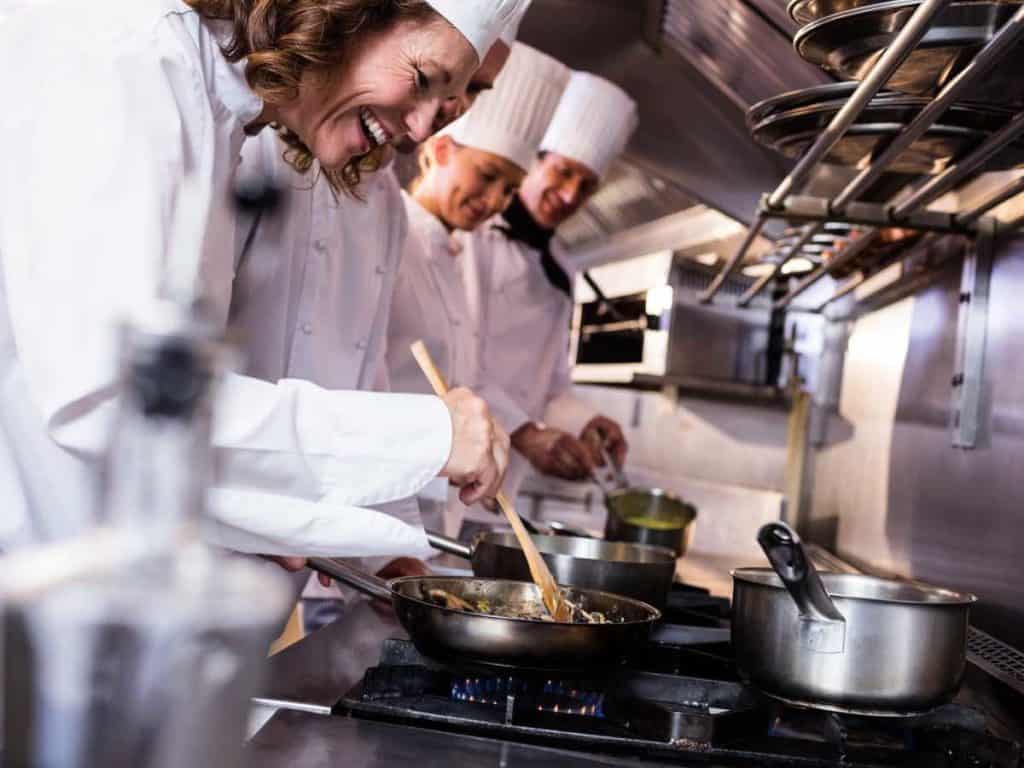
Passion for Cooking
Being passionate as a cook is critical to attaining success and reaching your professional goal. This is especially true since working as a cook isn’t particularly a walk in the park — without passion, chances are that you will immediately pursue another calling at the first sight of a challenge or an obstacle in a very busy kitchen.
There are different types of cooks, and some of them make more money than the rest. If the goal is to reach the highest possible cook position after starting at the very bottom, having sufficient amounts of passion will give you all the determination necessary for honing skills and obtaining new ones vital for a much-desired promotion.
Creativity
Since you will be preparing food, which absolutely qualifies as an art piece on various levels, being creative is one of the most important qualities a cook should have in order to be good at what he or she does.
Of course, it will help a lot if you are creative enough to begin with in order to be able to come up with mouth-watering and eye-catching dishes.
But the good news is that creativity can also be learned — sharing the kitchen with food industry experts will certainly allow you to amplify your talents and skills.
Endurance
As mentioned earlier, it’s not unlikely for chefs and cooks to spend 50 to 70 hours per week working. As a cook, you will spend the vast majority of your time in the kitchen on your feet — you will be standing up slicing, dicing, kneading, mixing, frying, poaching, seasoning, plating, garnishing, etc.
Then there’s also the fact that you will be moving bags of ingredients and tools and equipment around the kitchen incessantly.
Indeed, if the goal is to become a good cook, it’s not enough that you know how to cook good — it’s also a must that you are able to put up with the physical demands of working in a commercial kitchen.
Stress tolerance
Perhaps no other place on the face of the planet is more chaotic and nerve-racking during mealtimes than a restaurant kitchen.
It’s for this reason why you should not consider working as a cook if you respond poorly to stress. So, before you even attempt to hand in that resume to a food service establishment, master the art of grace under pressure.
Knowing your stressors and learning techniques on how to lower your stress levels during and after work hours is a must. It will also help a lot if you adopt a healthy diet and lifestyle, exercise regularly and get a good night’s sleep. In the kitchen, you can keep stress to a minimum by staying organized and keeping your station neat and clean.
Team-playing skills
Many different people can be found in most commercial kitchens at any given time, ranging from executive chefs to dishwashers. All of them have to work together for the smoothest possible operation of the establishment.
On an everyday basis, you will be sharing the workplace with an assortment of individuals — some of them will require you to lend a hand, while others will be there to help you out. Either way, knowing how to work as a part of a team is an important quality of a good cook no matter how far through the ranks you get.
Individual work
While it’s true that being a team player is a trademark of a good cook, it’s also a plus for him or her to be able to carry out tasks autonomously. After all, especially during peak-time restaurant operations when there’s mayhem in the kitchen, it’s not always that the chef in charge can inspect and approve your output.
But the good news is that a cook tends to perform the very same set of chores in the day-to-day business operations, which is why he or she can carry out many designated kitchen tasks with very minimal to no supervision.
Attention to detail
From cooking a dish by following a signature recipe to plating the food according to the restaurant’s image, it’s of utmost importance for a cook to be thorough and meticulous in carrying out his or her tasks.
Preparing food is an art and a science, and both require one’s undivided attention — even the smallest of carelessness, such as failure to add a dollop of sauce or remove a rogue hair, can leave a massive dent in the reputation of your employer.
To be a good cook, you should learn how to allocate your cognitive resources to attain thoroughness.
Being Open-minded
Especially if you are a new cook who just stepped foot in his or her very first commercial kitchen, it’s very much likely for some of your more experienced co-workers to have an opinion about your output.
Some of those opinions can be very good for your self-confidence and self-esteem, while others can be potentially damaging to your morale.
But that’s okay — constructive criticisms can pave the way for the attainment of knowledge and sharpening of skills. It goes without saying that being an open-minded person can help you improve as a cook by leaps and bounds.
Health- and safety-conscious
As a cook, it’s not just the satisfaction of the eyes and taste buds of the customers you should be after — you should also make sure that everyone will leave the establishment in the pink of health and in one piece.
Because of this, an aspiring cook like you should always remember by heart and follow, too, strict health and safety standards in a commercial kitchen. It all starts with your being clean and hygienic all the time in the workplace as well as making sure that all appliances and equipment are properly used and maintained.
Just Before You Apply as a Cook
Refrain from assuming that all people who can cook at home can be cooks at establishments where meals are served, from casinos to restaurants. There are certain skills and traits, too, a person should have in order to be able to go from cooking in a domestic kitchen to a commercial kitchen.
Above, we talked about the things that differentiate chefs and cooks as well as the must-have qualities of good cooks — if you have what it takes, then it’s a wonderful idea to consider becoming a professional cook.
But just because you are a phenomenal cook doesn’t mean right away that you will be a cook forever.
As mentioned earlier, while it’s great to have an associate degree in culinary arts (or any other related degree), it’s not a requirement for someone who wants to become a chef one day. By accumulating cooking knowledge and skills and impressing each time with your performance, you can gradually climb up your way to being a chef.
Read Also: What is Master Baker
